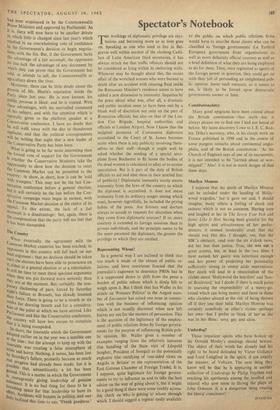Representing Whom?
In a general way I am inclined to think that too much is made of the abuses of public re- lations, and have sometimes fancied that the journalist's eagerness to denounce PROs has in it a suppressed desire to shift from the press a burden of public odium which is dimly felt to weigh upon it. But I think that Ian Waller in his article on 'Pressure Politics' in the August num- ber of Encounter has raised one issue in connec- tion with the business of influencing opinion which is not usually discussed when new left knives are out for the masters of persuasion. This is the question of the legitimacy of the employ- ment of public relations firms by foreign govern- ments for the purpose of influencing British pub- lic opinion. Mr. Waller gives a number of examples ranging from the relatively innocent (the handling of the State visit of Leopold Senghor, President of Senegal) to the potentially explosive (the rectifying of 'one-sided views on Angola in Britain' or the representation of the
East German Chamber of Foreign Trade). It is, I suppose, quite legitimate for foreign govern- ments to try to influence us and to take the best advice on the way of going about it, but it might be a good thing if there were some readily access- ible check on who is getting at whom through which. I should suggest a register easily available to the public on which public relations firms would have to inscribe those clients who can be classified as 'foreign governments' (i.e. Eastern European government front organisations as well as more definitely official sources) as well as a brief definition of what they are being employed to do for them. Then, once registered as agents of the foreign power in question, they could get on with their job of persuading an enlightened pub- lic opinion. Some such measure, so it seems to me, is likely to be forced upon democratic governments sooner or later.






























 Previous page
Previous page